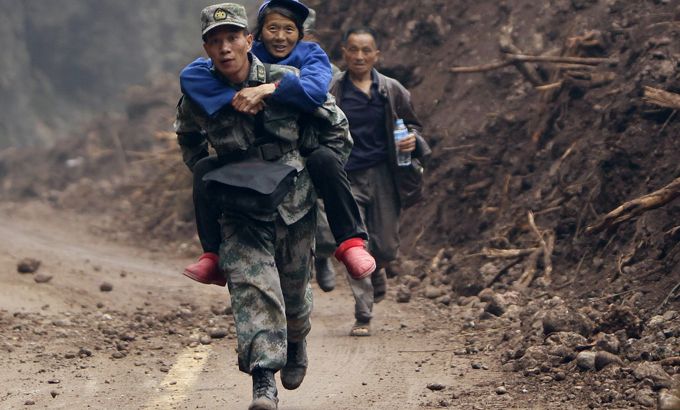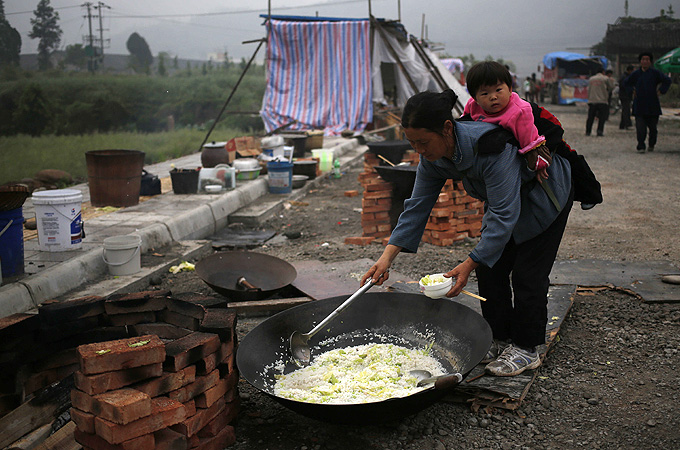China faces fresh crisis in quake-hit Sichuan
Water and food shortages reported as rescue teams battle landslides and aftershocks to bring basic supplies.

Aid and rescue teams have battled landslides and more than 2,000 aftershocks in an effort to find survivors and get basic needs into remote areas of China’s earthquake-ravaged Sichuan province.
Clogged roads and debris impeded rescuers on Monday as they travelled often on foot in the mountainous southwest region after a 6.6-magnitude quake left at least 188 dead.
Keep reading
list of 4 itemsCould shipping containers be the answer to Ghana’s housing crisis?
Thousands protest against over-tourism in Spain’s Canary Islands
Holding Up the Sky: Saving the Indigenous Yanomami tribe in Brazil’s Amazon
Saturday’s earthquake left many people missing and more than 11,000 injured, according to state media. Local authorities said around 17,000 families had lost their homes.
Some people on the outskirts of the disaster zone complained they felt that the government had forgotten them as they were left without basic supplies, as huge boulders have blocked rescue vehicles along roads leading to some of the worst-hit areas in rough terrain.
Pia MacRae, Country Director for Save the Children in China, told Al Jazeera that aftershocks and mudslides had caused huge problems for aid workers for the international children’s charity in trying to reach remote areas.
 |
| Many tents are housing some of the 17,000 families made homeless, but thousands more are reportedly needed [AFP] |
MacRae said that Save the Children teams, many of whom responded to the 2008 Sichuan earthquake disaster, and government troops had managed to bring in supplies on foot to some remote areas by Sunday night.
She said the government’s first response to the disaster had been strong, but aid workers had seen gaps in what was normally provided quickly because of the difficulty of accessing the areas.
“We’re finding in the communities that there are shortages of water, there’s shortages of food, tents, plastic sheeting,” MacRae told Al Jazeera.
“And then for the severely affected families, they’re going to be needing obviously household kits to be able to start cooking, etcetera.”
Villagers along the outer edge of the earthquake zone complained to Al Jazeera that they had received almost no government help despite the massive relief effort taking place.
In 2008, the outlying areas escaped the worst of the damage, so residents said buildings were not reinforced and that made them more prone to damage in this latest quake.
Earthquake survivors in Tianquan County said they were in urgent need of tents as more rain was expected in the region.
 |
| Aid has begun to get through to quake-ravaged areas, but thousands of people are still desperate for basic needs [EPA] |
Tremours damaged 90 percent of all the homes in Tianquan and residents were in urgent need of tents.
Possible rains during the next few days will make it difficult for them to stay in makeshift tents and have raised fears of more potentially deadly landslides.
Zhao Changlin, secretary of the County Committee of the Chinese Communist Party, said that preliminary estimates showed 12,000 more tents were needed.
Tents were needed in particular for injured people who had to receive treatment under temporary canopies.
“We are waiting for more tents and we need many relief supplies,” said Chen Huaibin, president of Tianquan Hospital of Traditional Chinese Medicine.
“We will replace them [canopies] with tents if we get any.”
Civilians aid rescue
More than 17,000 Chinese soldiers and police have joined the rescue mission.
Survivors were carried out on the backs of neighbours and by helicopter, as rescuers were bolstered by thousands of civilian volunteers.
The disaster comes five years after a quake in Sichuan struck 200km from Lushan. It left 90,000 people dead or missing.
The 2008 earthquake triggered an outpouring of public anger after the discovery that schools collapsed while other buildings did not, creating suspicions of corruption and shoddy construction.
Despite of complaints over the latest quake, the response on China’s Twitter-like “weibo” websites to Saturday’s disaster has overwhelmingly been one of support for the government’s efforts.